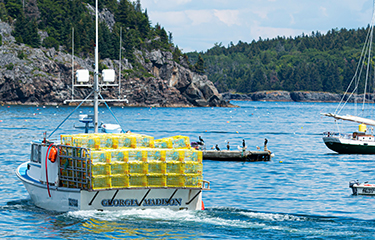The Monterey Bay Aquarium Seafood Watch has released a new set of updated seafood ratings that place North American lobster and Canadian snow crab in the “avoid” category, primarily due to potential impacts the fishery could be having on North Atlantic right whales.
The updated Seafood Watch ratings, released in September 2022, reported the stock status of North American lobster (Homarus americanus) as “uncertain,” though it said overfishing is not occurring. However, it moved the fishery to its red “avoid” list, down from “good alternative,” due to the potential risks the fishery poses North Atlantic right whales. An estimated 330 North Atlantic right whales remain alive in the wild and the species is classified as critically endangered.
“This fishery poses a risk to overfished or at-risk species, including endangered North Atlantic right whales. Entanglement in fishing gear is the leading cause of serious injury and death to North Atlantic right whales,” the Seafood Watch’s latest ratings update said. “As a result, bycatch management is rated ineffective for all pot and set gillnet fisheries operating within the North Atlantic right whale’s range because current management measures do not go far enough to mitigate entanglement risks and promote recovery of the species.”
The Canadian snow crab fisheries in the Maritimes, Southern Gulf of Saint Lawrence, Northern Gulf of Saint Lawrence and Estuary, and Newfoundland and Labrador management regions, and gillnet fisheries within the right whale’s range also faced a downgrade due to their potential impact on the right whale population.
In response to the new rating, nonprofit environmental group Oceana called on the U.S. National Marine Fisheries Service to increase its regulations to protect right whales.
“It’s unfortunate that the government’s failure to update the safeguards to protect North Atlantic right whales is having such serious consequences on these fisheries. Both fisheries and whales can thrive if the National Marine Fisheries Service takes immediate action and creates effective measures for these whales,” Oceana Campaign Director Gib Brogan said. “To give this species a fighting chance, the agency must reduce the number of vertical lines and gillnets in the water and transition the fishery to whale-safe fishing gear. Fishery managers must increase protections to save North Atlantic right whales so seafood retailers, consumers, and restaurants can put American lobster and crab back on the menu.”
NOAA Fisheries has undertaken a multi-year effort to update its fishing regulations for the lobster fishery in the U.S. Northeast, following a ruling by a federal judge in 2020 declaring the fishery out of compliance with the U.S. Endangered Species Act. In 2021, NOAA announced new regulations for the lobster fishery, which the industry has been fighting via a slew of lawsuits and lobbying efforts. Subsequent court decisions confirmed most of NOAA's new rules, but a July 2022 court decision found those rules didn’t go far enough in protecting the whales.
Canada's snow crab fishery has also faced pressure from politicians and environmentalist to reform its methods to better protect right whales. In 2018, researchers said the species' survival could be dependent on the snow crab industry’s flexibility, and U.S. senators called on Canada to increase its whale protections. In response, Canada implemented new gear-marking regulations to better identify the exact cause of whale entanglement, which led to multiple right whale deaths in 2018 and 2019.
The lobster industry in the U.S. state of Maine has asserted it has been at the forefront of efforts to protect whales. According to the Maine Lobstermen’s Association, all floating line has been removed from the water's surface, reduced lines in the water by adding more traps per buoy line, removed lobster gear from some fishing grounds for one-third of the year, replaced floating groundlines with sinking groundlines, incorporated weak links and weak inserts into lines, and created new gear markings. All told, the fishery has removed 30,000 miles of line from the water, the MLA said. But it said NOAA's new measures won’t protect whales and will “eliminate the Maine lobster fishery.”
“Right whales are not dying in Maine lobster gear,” MLA Executive Director Patrice McCarron said. “Lobstermen have done everything they have been asked to protect right whales and remain committed to doing their part to save the species.”
Photo courtesy of WoodysPhotos/Shutterstock







